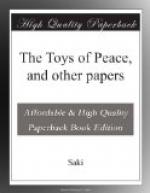“Never was Clytemnestra’s kiss sweeter than on the night she slew me,” she quoted, but made the quotation to herself.
The last hour of the poll was a period of unremitting labour for both parties; it was generally estimated that not more than a dozen votes separated the candidates, and every effort was made to bring up obstinately wavering electors. It was with a feeling of relaxation and relief that every one heard the clocks strike the hour for the close of the poll. Exclamations broke out from the tired workers, and corks flew out from bottles.
“Well, if we haven’t won; we’ve done our level best.” “It has been a clean straight fight, with no rancour.” “The children were quite a charming feature, weren’t they?”
The children? It suddenly occurred to everybody that they had seen nothing of the children for the last hour. What had become of the three little Jutterlys and their donkey-cart, and, for the matter of that, what had become of Hyacinth. Hurried, anxious embassies went backwards and forwards between the respective party headquarters and the various committee-rooms, but there was blank ignorance everywhere as to the whereabouts of the children. Every one had been too busy in the closing moments of the poll to bestow a thought on them. Then there came a telephone call at the Unionist Women’s Committee-rooms, and the voice of Hyacinth was heard demanding when the poll would be declared.
“Where are you, and where are the Jutterly children?” asked his mother.
“I’ve just finished having high-tea at a pastry-cook’s,” came the answer, “and they let me telephone. I’ve had a poached egg and a sausage roll and four meringues.”
“You’ll be ill. Are the little Jutterlys with you?”
“Rather not. They’re in a pigstye.”
“A pigstye? Why? What pigstye?”
“Near the Crawleigh Road. I met them driving about a back road, and told them they were to have tea with me, and put their donkeys in a yard that I knew of. Then I took them to see an old sow that had got ten little pigs. I got the sow into the outer stye by giving her bits of bread, while the Jutterlys went in to look at the litter, then I bolted the door and left them there.”
“You wicked boy, do you mean to say you’ve left those poor children there alone in the pigstye?”




